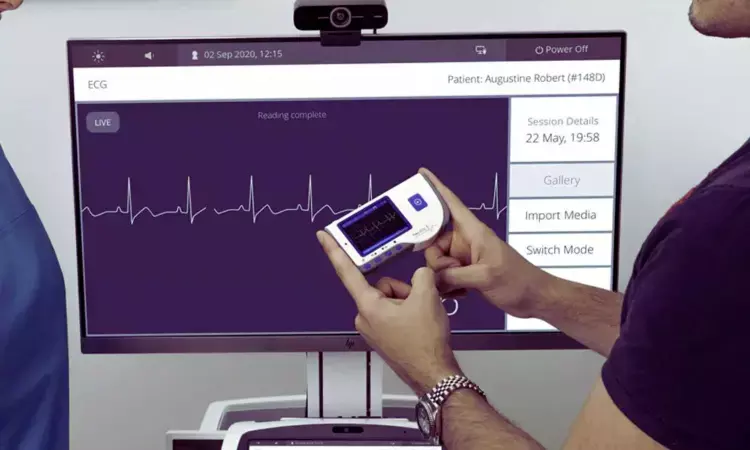- Home
- Medical news & Guidelines
- Anesthesiology
- Cardiology and CTVS
- Critical Care
- Dentistry
- Dermatology
- Diabetes and Endocrinology
- ENT
- Gastroenterology
- Medicine
- Nephrology
- Neurology
- Obstretics-Gynaecology
- Oncology
- Ophthalmology
- Orthopaedics
- Pediatrics-Neonatology
- Psychiatry
- Pulmonology
- Radiology
- Surgery
- Urology
- Laboratory Medicine
- Diet
- Nursing
- Paramedical
- Physiotherapy
- Health news
- Fact Check
- Bone Health Fact Check
- Brain Health Fact Check
- Cancer Related Fact Check
- Child Care Fact Check
- Dental and oral health fact check
- Diabetes and metabolic health fact check
- Diet and Nutrition Fact Check
- Eye and ENT Care Fact Check
- Fitness fact check
- Gut health fact check
- Heart health fact check
- Kidney health fact check
- Medical education fact check
- Men's health fact check
- Respiratory fact check
- Skin and hair care fact check
- Vaccine and Immunization fact check
- Women's health fact check
- AYUSH
- State News
- Andaman and Nicobar Islands
- Andhra Pradesh
- Arunachal Pradesh
- Assam
- Bihar
- Chandigarh
- Chattisgarh
- Dadra and Nagar Haveli
- Daman and Diu
- Delhi
- Goa
- Gujarat
- Haryana
- Himachal Pradesh
- Jammu & Kashmir
- Jharkhand
- Karnataka
- Kerala
- Ladakh
- Lakshadweep
- Madhya Pradesh
- Maharashtra
- Manipur
- Meghalaya
- Mizoram
- Nagaland
- Odisha
- Puducherry
- Punjab
- Rajasthan
- Sikkim
- Tamil Nadu
- Telangana
- Tripura
- Uttar Pradesh
- Uttrakhand
- West Bengal
- Medical Education
- Industry
Handheld one-lead ECG may detect AF in outpatient setting, with high sensitivity and specificity: Study

Sweden: A recent study published in the Journal of Electrocardiology has shed light on the sensitivity and specificity of handheld one-lead ECG detecting atrial fibrillation (AF) in an outpatient clinic setting.
The researchers found that in a health-care outpatient setting, Zenicor One handheld ECG had high specificity and sensitivity for detecting atrial fibrillation compared with 12‑lead ECG.
Atrial fibrillation is a major cause of mortality and morbidity worldwide, The prevalence of AF in adults is estimated to be thirty-seven million individuals globally. Atrial fibrillation is estimated to cause 10–12% of all ischemic strokes. Since many patients have unspecific or no symptoms (silent AF), and as the risk of stroke can be reduced effectively by anticoagulation, there is a need to consider screening for AF in high-risk populations and patients with suspected arrhythmias.
As handheld and wearable ECG devices are gaining popularity and availability for atrial fibrillation screening, the researchers stress the importance of assessing the diagnostic quality of such devices.
Against the above background, Johan Malmqvist, Dept of Clinical Physiology, Danderyd University Hospital, Stockholm, Sweden, and colleagues aimed to validate the specificity and sensitivity of the Zenicor One handheld ECG device for detection of atrial fibrillation in an outpatient clinical setting.
For this purpose, the researchers examined patients attending outpatient clinics at Danderyd Hospital (n = 220) with one lead handheld ECG immediately after standard care 12‑lead ECG recording. Twelve recordings were excluded (atrial flutter or pacing) or missing.
Two senior cardiologists dichotomously categorized the recordings as “atrial fibrillation” or “not atrial fibrillation”. In cases of diverging interpretations, a third senior cardiologist had the deciding vote. Specificity and sensitivity in diagnosing atrial fibrillation were calculated with 12‑lead ECG as the gold standard.
The researchers found that specificity and sensitivity for the diagnosis of atrial fibrillation with one-lead handheld ECG and 12‑lead ECG as the gold standard were 99% and 98%, respectively.
The study showed high sensitivity and specificity of Zenicor One handheld ECG in a health-care outpatient setting for detection of atrial fibrillation when compared with 12‑lead ECG.
"We report high diagnostic performance of the Zenicor One handheld one‑lead ECG device compared to 12‑lead ECG in an outpatient setting. The arrhythmia analysed against sinus rhythm was atrial fibrillation, the arrhythmia most relevant for large-scale arrhythmia screening," the researchers wrote.
Reference:
Malmqvist, J., Engdahl, J., Sjölund, G., & Doliwa, P. (2024). Sensitivity and specificity of handheld one lead ECG detecting atrial fibrillation in an outpatient clinic setting. Journal of Electrocardiology. https://doi.org/10.1016/j.jelectrocard.2024.02.001
Dr Kamal Kant Kohli-MBBS, DTCD- a chest specialist with more than 30 years of practice and a flair for writing clinical articles, Dr Kamal Kant Kohli joined Medical Dialogues as a Chief Editor of Medical News. Besides writing articles, as an editor, he proofreads and verifies all the medical content published on Medical Dialogues including those coming from journals, studies,medical conferences,guidelines etc. Email: drkohli@medicaldialogues.in. Contact no. 011-43720751


